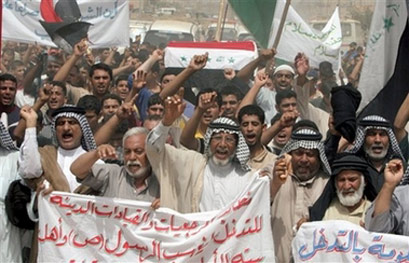5 US soldiers killed in Iraq
(Agencies)Updated: 2007-05-19 21:51
The American military widened the search for three missing US soldiers, detaining nine people in a raid Saturday about 25 miles northwest of where the Americans were captured last weekend.
 The American military widened the search for three missing US soldiers, detaining nine people in a raid Saturday about 25 miles northwest of where the Americans were captured last weekend. [Agencies]  |
The US command said Saturday five more American soldiers were killed. One died Saturday from a roadside bomb south of Baghdad. Four died Friday, one in the western province of Anbar, one by small arms fire south of the capital and two by a roadside bomb and small arms fire in northwestern Baghdad, the military said.
At least three mortar shells or rockets slammed into the Green Zone after British Prime Minister Tony Blair arrived for talks with Prime Minister Nouri al-Maliki and other Iraqi leaders, injuring one person. It was not clear how far Blair was from the blasts.
A US military statement said the nine detainees were taken into custody in the town of Amiriyah, a Sunni insurgent area, following "tips and information leads in the disappearance of three US soldiers" from the Army's 10th Mountain Division.
Tribes in the Amiriyah area are related to those who live close to where the soldiers were seized May 12 in an attack in which four US troops and one Iraqi were killed.
In addition, US troops arrested two people in Baqouba "associated" with the al-Qaida command network, the military said. Baqouba is 35 miles northeast of Baghdad, and it was unclear whether their arrest was directly related to the search for the missing soldiers.
An al-Qaida-linked group has claimed responsibility for the kidnapping after the attack in which four American soldiers and an Iraqi were killed.
The focus of the search is around the village of Quarghuli, 12 miles south of Baghdad, where the soldiers were captured following an attack on their observation post.
During the Green Zone barrage, one round hit the British Embassy compound, according to security officials, who spoke on condition of anonymity because they were not supposed to release the information. It was not known whether Blair was in the compound when shell exploded.
A fourth projectile exploded just outside the Green Zone, US Embassy spokesman Lou Fintor said. Fintor gave no further details and did not mention Blair's presence.
Blair's official spokesman downplayed the incident, saying there was "nothing to suggest anything other than business as usual."
Mortar and rocket attacks against the Green Zone have increased in recent weeks, raising alarm among US officials who live and work in what had been considered the only secure haven in the turbulent Iraqi capital.
The US ordered embassy employees to wear protective vests and helmets after four Asian contractors working for the US government were killed May 3 when rockets or mortars slammed into the Green Zone, a 3.5 square-mile-area along the Tigris River in the center of the city.
This month, reporters covering the visit of Vice President Dick Cheney were hustled into a secure area when a large explosion rattled windows in the US Embassy. Cheney spokeswoman Lea Anne McBride said the vice president's meeting "was not disturbed and he was not moved."
In March, U.N. Secretary-General Ban Ki-moon ducked for cover when a shell exploded about 50 yards away during a joint news conference with al-Maliki.
On Saturday, the office of parliament speaker Mahmoud al-Mashhadani confirmed that Sunni official's brother, Mohammed al-Mashhadani, was kidnapped two days before in western Baghdad. A Sunni political party Web site said only that Mohammed al-Mashhadani was grabbed by unknown gunmen near a Sunni mosque in the capital's Jamaa district.
Iraqi military officials also said the commander of Iraqi troops in Diyala province, scene of recent sharp fighting, had been replaced after allegations that he was biased against Sunnis.
Maj. Gen. Shaker Hulayel, commander of the Iraqi 5th Division, was replaced by Brig. Gen. Abdul-Hussein al-Timimi, according to another Iraqi general, Saman Assi Talabani.
"I think it is a good decision and the replacement should have taken place months ago," Talabani said, citing "a lot of mistakes" that had "made the security situation worse and out of control."
Elsewhere, Shiite militiamen from the Mahdi Army traded gunfire Saturday with Iraqi soldiers in southwestern Baghdad's Baiyaa district, killing one of the soldiers, police said.
Sectarian tensions have been rising in the area in recent weeks after a brief lull following the Feb. 14 launch of the Baghdad security crackdown.
In Saddam Hussein's hometown of Tikrit, 80 miles north of Baghdad, police received the bodies of seven men killed in clashes the night before in Samarra. It was unclear whether they were combatants or civilians caught up in the violence which has been increasing in the mostly Sunni city north of Baghdad.
|
||
|
||
|
|